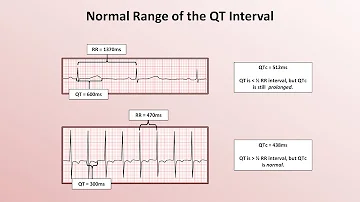What is long QT in ECG?
In long QT syndrome, the heart's electrical system takes longer than usual to recharge between beats. This delay is called a prolonged QT interval. It may be seen on an electrocardiogram (ECG). Long QT syndrome is often grouped into two main categories, depending on the cause.
What does it mean to have a long QT interval?
A prolonged QT interval is an irregular heart rhythm that can be seen on an electrocardiogram. It reflects a disturbance in how the heart's bottom chambers (ventricles) send signals. In a prolonged QT interval, it takes longer than usual for the heart to recharge between beats.

Is long QT serious?
Long QT syndrome is a condition that increases risk for dangerous arrhythmias. It can lead to fainting, cardiac arrest and sudden cardiac death.
What causes long QT in ECG?
Long QT syndrome is usually caused by a faulty gene inherited from a parent. The abnormal gene affects the heart's electrical activity. Certain medicines can also trigger long QT syndrome, including some types of: antibiotics.
Is long QT normal?
Long QT syndrome (LQTS) is a potentially lethal yet highly treatable genetic heart rhythm disorder (“cardiac channelopathy”) that affects an estimated 1 in 2500 people.
Can stress and anxiety cause prolonged QT?
Ann Noninvasive Electrocardiol.
How do I fix my QT interval?
Corrected QT interval (QTc)
Fridericia formula: QTC = QT / RR. Framingham formula: QTC = QT + 0.154 (1 – RR) Hodges formula: QTC = QT + 1.75 (heart rate – 60)
Can you recover from long QT?
Congenital long QT syndrome can be treated, but it can't be "cured" and won't go away on its own. Acquired long QT syndrome usually stops if the cause (like certain medicines) goes away. Long QT syndrome can affect people of all ages, but is sometimes more serious in children.
Can you live with long QT?
LQTS is usually a lifelong condition. The risk of having an abnormal heart rhythm that leads to fainting or cardiac arrest may lessen as you get older, especially in men after age 40. However, the risk never completely goes away. In boys who have LQTS, the QT interval often returns to normal after puberty.
Can long QT be corrected?
If an underlying medical condition or medication causes it, it's called acquired long QT syndrome. This type of long QT syndrome is usually reversible when the underlying cause is identified and treated.
Is long QT a heart disease?
Long QT syndrome (LQTS) is a heart signaling disorder that can cause fast, chaotic heartbeats (arrhythmias). A heart signaling disorder is also called a heart conduction disorder. Some people are born with altered DNA that causes long QT syndrome (congenital long QT syndrome).
Who is at risk for long QT?
Risk factors
Having a parent, sibling or child with long QT syndrome. Using medications known to cause prolonged QT intervals. Being female and on heart medication. Excessive vomiting or diarrhea, which causes electrolyte imbalances.
Can you live a normal life with long QT?
If you have LQTS, your heart's structure is perfectly normal, but you may have fast, chaotic heartbeats. The fast heartbeats may cause a sudden fainting spell or a seizure. In some cases, the heart can stop and cause sudden death. Long QT is treatable.
Can long QT be cured?
Congenital long QT syndrome can be treated, but it can't be "cured" and won't go away on its own. Acquired long QT syndrome usually stops if the cause (like certain medicines) goes away. Long QT syndrome can affect people of all ages, but is sometimes more serious in children.
Can long QT be caused by stress?
LQTS is characterized by the association of several distinctive electrocardiographic features, among which prolongation of the QT interval is the best known, with life-threatening arrhythmias that usually occur under conditions of physical or psychological stress.
Should I worry about long QT syndrome?
A long QT interval can upset the careful timing of the heartbeat and cause sudden uncontrollable fast heart rhythms. LQTS is rare, and not everyone who has LQTS has dangerous heart rhythms. When they do occur, though, they can be fatal.
Can I live a normal life with long QT?
We learned that by taking beta blockers (a medicine to reduce heart rate and blood pressure) and seeing a cardiologist regularly, we could live normal lives, without any symptoms — and we have.
